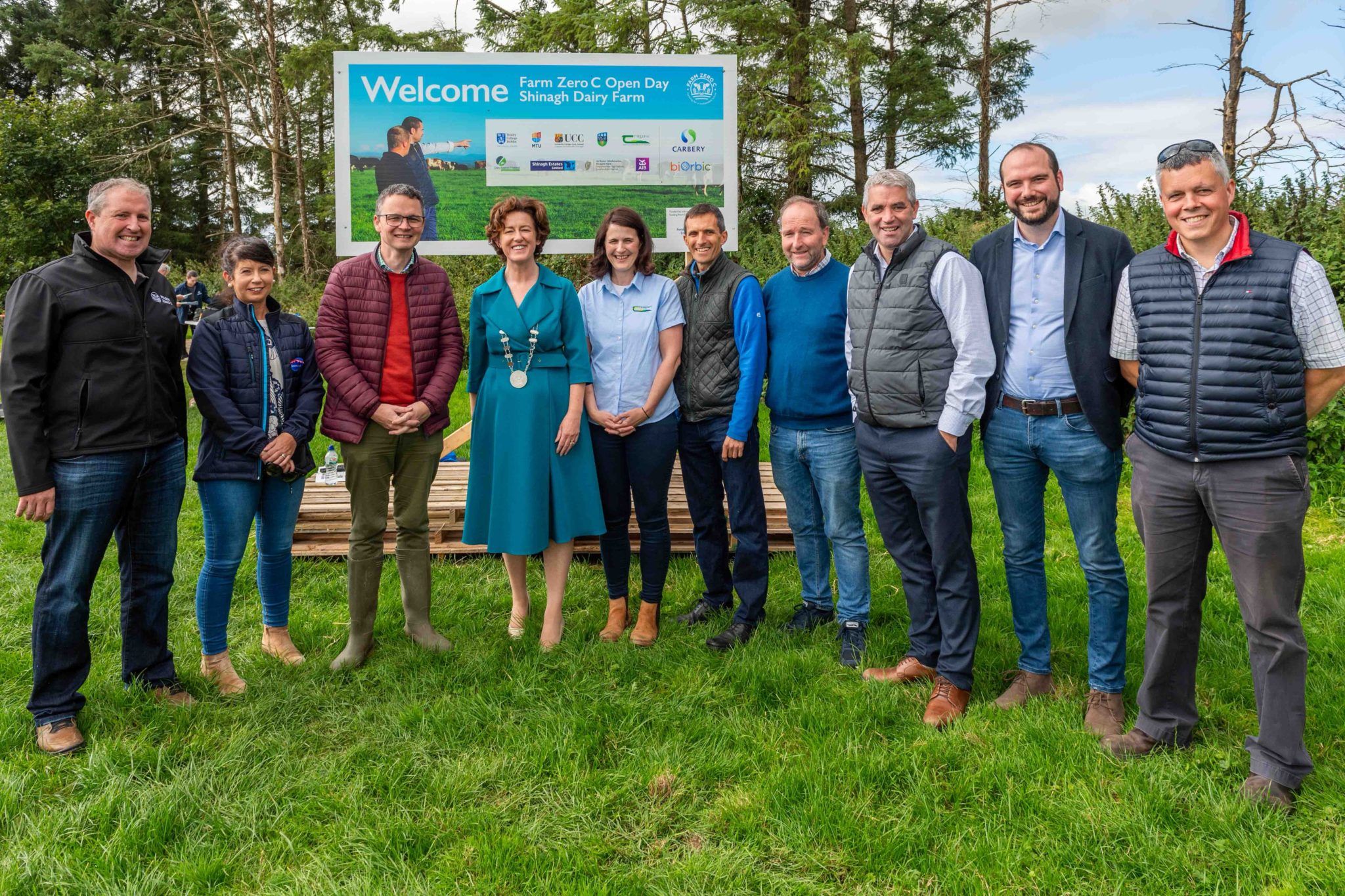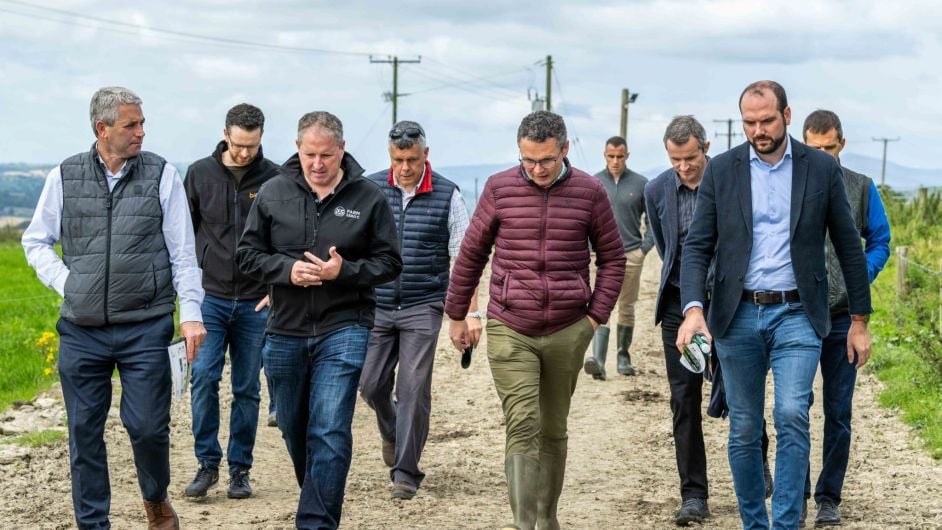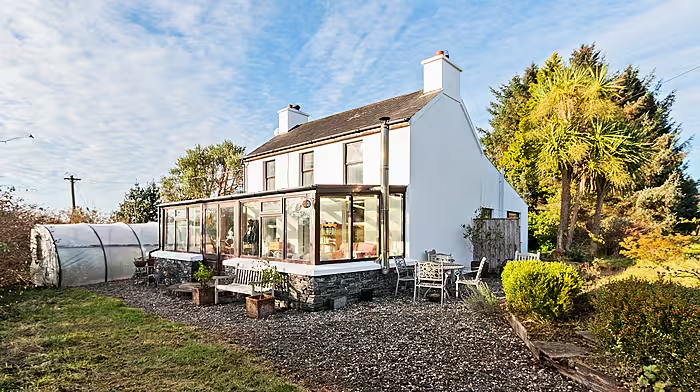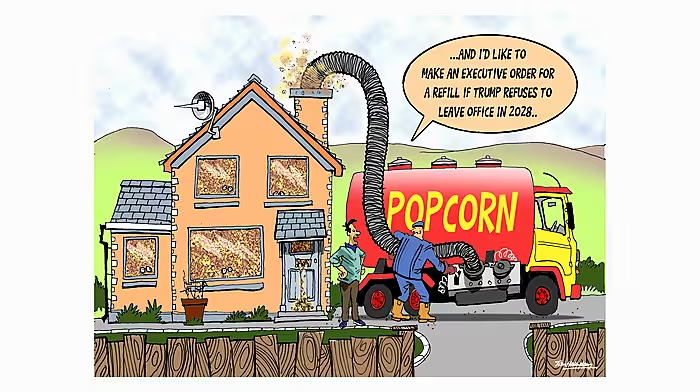THE Farm Zero C project at Shinagh Farm Estates in Bandon has seen reductions of carbon emissions of 27% since testing began.
This emerged at the second open day for the Farm Zero C project, held last week at the base of the project, Shinagh Farm Estates. The project was established in 2020 with the intention of producing a model for a climate neutral dairy farm.
Shinagh Dairy Farm was set up in 2011 as part of a joint programme between Teagasc and Carbery. The programme plans to show, using world-leading technology, that dairying on a grass-based system can be profitable and sustainable.
 Enda Buckley, director of sustainability, Carbery; Leigh Ann Tobin Bandon Co-op, Minister Patrick O’Donovan, Cllr Gillian Coughlan, Grainne Hurley, regional manager Teagasc Cork West; Prof Kevin O’Connor, director, BiOrbic; Sean Deasy, chairperson, Shinagh Farm Estates; Sen Tim Lombard, Cllr Noel O’Donovan and Cllr John Michael Foley at the Farm Zero C Open Day in Shinagh, Bandon. (Photo: Andy Gibson)
Enda Buckley, director of sustainability, Carbery; Leigh Ann Tobin Bandon Co-op, Minister Patrick O’Donovan, Cllr Gillian Coughlan, Grainne Hurley, regional manager Teagasc Cork West; Prof Kevin O’Connor, director, BiOrbic; Sean Deasy, chairperson, Shinagh Farm Estates; Sen Tim Lombard, Cllr Noel O’Donovan and Cllr John Michael Foley at the Farm Zero C Open Day in Shinagh, Bandon. (Photo: Andy Gibson)Since testing began in 2018, a 27% reduction in the carbon emissions from the farm has been achieved through a range of measures adopted.
The event was attended by hundreds of farmers, representatives from the agri and farming sectors, scientists and interested parties including Minister of Further and Higher Education, Research, Innovation and Science Patrick O'Donovan and other local and national representatives.
Minister O’Donovan, whose Department has a central role in the project through the Research Ireland co-funding said Shinagh was a ‘great example of the type of project that we want to support through Taighde Éireann - Research Ireland.
‘It is taking the best scientific approaches and research, in cooperation with industry partners like Carbery, and working to find solutions that will benefit us all. Most importantly, it is doing this work in partnership with farmers.
‘Farmers are eager to adapt and improve their approaches all the time, and as Minister for Research and Innovation I am really pleased to see projects like this getting support and attention across the agri-sector. This initiative aligns with the Department's goals of supporting innovative research that benefits the broader community by tackling critical environmental challenges.’
On a walk through the farm, visitors heard from representatives from each work package of the project, highlighting the progress in the last two years, achievements and next steps. Each stage had a take home message for farmers to implement some of these approaches on their own farms.
 The large group of farmers and interested stakeholders who attended the event at Farm Zero C being briefed about phase 1 of the project. (Photo: Andy Gibson)
The large group of farmers and interested stakeholders who attended the event at Farm Zero C being briefed about phase 1 of the project. (Photo: Andy Gibson)
Carbery chief executive Jason Hawkins said taking the information from Farm Zero C into a practical setting is now key. ‘It is great to see the progress being achieved under Farm Zero C, and what is essential now, for farmers, is that they can take some of the expertise trialled on Shinagh and apply it on their own farms. Carbery is incentivising proven technologies from Farm Zero C through our FutureProof sustainability bonus, and we would like to see further supports for farmers as they embrace new approaches and technologies.’
Co-chair of the project for BiOrbic, Prof Kevin O’Connor stated, ‘We are really pleased with the initial results of the project, and appreciative of all the partners who have supported this journey. We look forward now to carrying this work forward into Farm Zero C phase 2.0, where we will build on our findings and promote uptake by farmers and seek solutions for methane emissions best suited to Ireland’s grass based dairy system.’
Farm Zero C is now entering phase 2 of the project, which will develop on the research from Phase 1.0, with focus areas on methane reduction, soil health, social science and more.
 Minister O’Donovan speaking to attendees during his tour of Farm Zero C. (Photo: Andy Gibson)
Minister O’Donovan speaking to attendees during his tour of Farm Zero C. (Photo: Andy Gibson)Through BiOrbic’s national structure, the project will be working with several universities. UCD will trial methane reducing feed additives, with the goal of implementing an additive that can be incorporated into the grazing system. UCC will lead the soil health work package, and will conduct research of soil fertility improvement, clover establishment, nutrient availability and slurry separation technologies.
The social science work package will be led by Teagasc and will look at attitudes towards sustainable agriculture in the farming communities and the wider public.
In addition to these work packages, the project will continue practices to improve water and air quality, biodiverse habitat quality, carbon sequestration, white clover implementation and fertiliser reduction.










